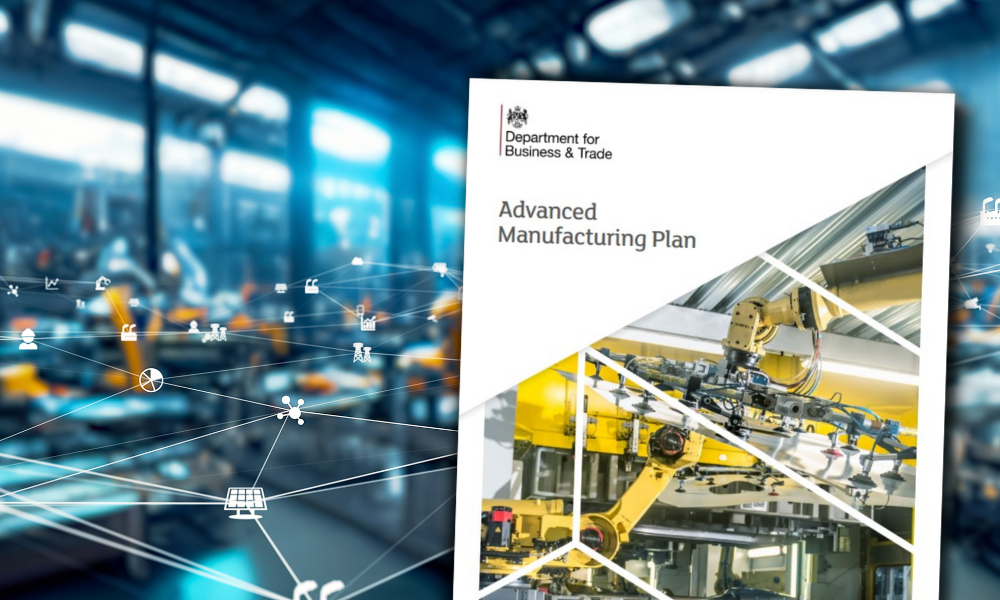Advanced Manufacturing Plan: Government funding boost to develop smart factories
2 min read

Last month’s Autumn Statement heralded the launch of the UK government’s Advanced Manufacturing Plan.
Outlining how £4.5 billion of funding will be used to ‘unlock investment in strategic manufacturing sectors’ over five years, the plan also highlights the importance of digitalisation on the path to Net Zero and how it can be leveraged to improve manufacturing productivity and efficiency.
Defined by the Department for Business & Trade as science and digital technologies like automation, advanced manufacturing is critical to developing new ways of working in a sector that contributes more than £200 billion every year to the UK economy.
A range of industries are set to benefit from the Advanced Marketing Plan, including automotive, batteries, and aerospace. Meanwhile, the plan is also being used to boost the government’s Made Smarter programme, which enables leading SMEs to access funding for digital transformation and decarbonisation projects.
One industry that is set to receive support is Food & Beverage. Delivering an estimated turnover of nearly £128 billion and with exports valued at more than £26 billion, F&B is the largest manufacturing sector in the UK.
RS Industria is already working with leading F&B firms to drive down energy consumption and improve productivity. By implementing real-time continuous monitoring technologies, RS Industria collates data in its cloud-based platform and turns it into powerful insight to lower emissions and costs.
Asset and component monitoring connects legacy and newer machines and turns ordinary factories into smart factories. The resulting insight flags issues, identifies trends and enables data-driven decisions, which propel businesses toward predictive maintenance for greater efficiencies.
What’s more, as the UK moves towards decarbonisation, businesses can use RS Industria to help achieve sustainability goals. For one RS Industria F&B customer, the use of the affordable and intuitive modular platform lowered energy consumption in just four weeks.
Driving down energy consumption
When engineers at Kerry Foods’ Tenbury Wells site in Worcestershire were tasked with driving down usage, zero visibility of how and where energy was being used severely impacted their ability to achieve results.
Though the site had some existing energy sub-meters positioned downstream from the main incomer, consumption data had to be manually collected weekly and was of limited use. By connecting these existing submeters to the RS Industria network and installing new sub-meters in other key locations and production lines, engineers were able to unlock valuable data and gain a real-time picture of where energy was being used.
With data broken down by asset, process, location, and time, high areas of waste - including equipment left on standby unnecessarily - were identified and resolved.
Visibility creates value
The results? A 14% reduction in energy consumption within four weeks, while carbon emissions have been driven down by some 60 tonnes per year. What is more, a granular level of detailed data at line level and the resulting insight has led to further energy savings of 15%.
Kerry Engineering Manager, Ben Botwright, explains: “The RS Industria platform enabled us to connect all our existing meters relatively easily. We were able to add some additional ones and, very quickly, we were able to get a comprehensive view of how we’re using our electricity by hour, by minute, by second, across the site.”
By monitoring critical assets in real-time, RS Industria can tackle high energy costs and emissions, while driving down unplanned downtime and freeing up valuable engineering resources.
Bright future
Richard Jeffers, Managing Director, RS Industria concludes: “By rolling out the use of advanced technologies like AI, robotics and the Industrial Internet of Things, UK manufacturers can make significant improvements to productivity while lowering costs.
“The Advanced Manufacturing Plan shines the spotlight on the importance of using digitalisation to reduce emissions and boost uptime. Solutions like RS Industria can play a critical role in helping UK firms transition towards cleaner production and improved manufacturing efficiencies.”


